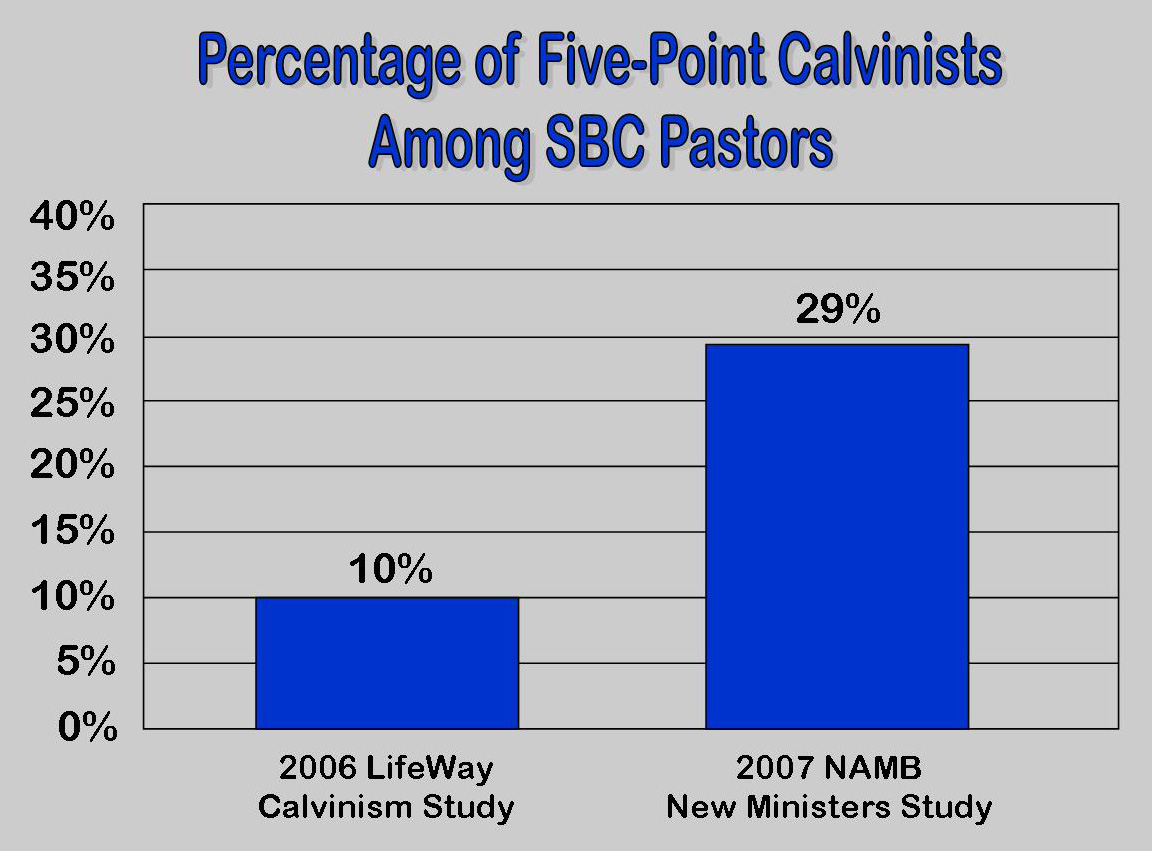
RIDGECREST, N.C. (BP)—-Nearly 30 percent of recent SBC seminary graduates now serving as church pastors identify themselves as Calvinists, according to data presented during the opening session of a conference on Reformed theology and the Southern Baptist Convention.
By contrast in the SBC at large, the number of pastors who affirm the five points of Calvinism is around 10 percent, Ed Stetzer, director of LifeWay Research, said in reporting various findings by LifeWay Research and the North American Mission Board Center for Missional Research.
Such data, Stetzer noted Nov. 26, perhaps gives an indication why a conference such as “Building Bridges: Southern Baptists and Calvinism” is taking place. The three-day gathering, with approximately 550 attendees, is being co-sponsored by Founders Ministries and Southeastern Baptist Theological Seminary at LifeWay Ridgecrest Conference Center in North Carolina. Founders Ministries formed in 1982 to advance Reformed theology in SBC churches.
Stetzer’s presentation relayed additional information from a 2006 LifeWay Research study combined with 2007 research from NAMB’s Center for Missional Research, which surveyed SBC pastors who graduated from SBC seminary master’s degree programs between 1998 and 2004.
Stetzer, who also is LifeWay’s missiologist in residence, noted that the research showed that among pastors of Southern Baptist churches who are recent SBC seminary graduates, 29 percent indicated they are Calvinists. Stetzer said 27 percent of 1,234 recent seminary graduate respondents serving in SBC church leadership positions “somewhat agree” or “strongly agree” that they are five-point Calvinists, while 67 percent affirmed that God’s “grace is irresistible” and 58 percent said they believe “people do not choose to become Christians, God chooses and calls people who respond to him.”
The numbers of graduates who affirmed Calvinism rose steadily between students who graduated in 1998 and those who completed their degrees in 2004, Stetzer said. In the last year of the study, 34 percent of those serving in SBC churches identified themselves as five-point Calvinists.
“It would be difficult to say that Calvinism is not a growing influence in SBC life; [it] certainly [is] a growing influence in the graduates of our seminaries,” Stetzer said.
NAMB’s research complements the Calvinism study that LifeWay Research conducted in 2006, Stetzer noted. The LifeWay study surveyed a cross-section of 413 randomly selected SBC pastors. That study placed the number of pastors who affirm the five points of Calvinism in the SBC at around 10 percent.
NAMB’s survey, however, sought to examine recent seminary graduates only, many of whom likely would be younger than the pastors that the LifeWay study canvassed, Stetzer pointed out.
With regard to Calvinism and the SBC, Stetzer said NAMB’s research also demonstrated that:
— Churches pastored by Calvinists tend to have smaller attendance and typically baptize fewer persons each year. Stetzer cautioned the attendees to be careful in their speculations, explaining that this study did not look at “why.” However, he pointed out that recent graduates who are Calvinists do pastor smaller churches that baptize fewer people.
— Calvinistic churches, though they baptize fewer persons each year, have a “baptism rate” virtually identical to that of non-Calvinistic churches. Baptism rate is the number of annual baptisms relative to total membership, a statistic used to measure evangelistic vitality.
— Both Calvinistic and non-Calvinistic churches believe that local congregations should be involved in sponsoring missions and planting new churches. The study showed 95 percent of both types of Southern Baptists affirmed the necessity of missions and church planting.
— Calvinistic recent graduates report that they conduct personal evangelism at a slightly higher rate than their non-Calvinistic peers.
The bottom line, Stetzer said, is that Calvinistic churches compose a minority of congregations in the SBC, but their numbers are steadily growing, particularly as recent seminary graduates take the reins of leadership.
Referring to recent graduates, Stetzer explained, “The percentages tick up each year and if they continue to increase, then obviously the percentage of Calvinists in our churches and church leadership will continue to increase as well.
“Calvinism is on the rise among the most recent seminary graduates. If present trends continue, Calvinism will continue to grow as an influence in our convention.”
Stetzer encouraged both Calvinists and non-Calvinists to ratchet up their efforts to proclaim the Gospel to North America.
“Regardless of whether Calvinists are having a lower number of baptisms and a smaller attendance or baptizing the same in the baptism rate, the reality is none of these baptism rates or growth numbers should make any of us happy,” Stetzer said.
“At the end of the day, Calvinists and non-Calvinists alike in our churches are failing to engage lostness in North America. This theological discussion has to lead to missional action and that missional action needs to cause Calvinists and non-Calvinists alike to love each other and to encourage each other and to provoke one another on to love and good deeds.”
–30–
Jeff Robinson, director of news and information at Southern Baptist Theological Seminary, is one of the writers covering the “Building Bridges: Southern Baptists and Calvinism” conference. Audio podcast downloads of all the presenters are available at www.lifeway.com/insidelifeway. PowerPoint slides of Ed Stetzer’s presentation are available at his weblog, EdStetzer.com.
















